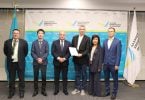Dr. Peter Tarlow of SaferTourism has plenty of detailed expert recommendation for anyone planning to restart their destination or tourism business after Coronavirus. Dr. Tarlow published an article entitled “How the Next Pandemic May Impact the World’s Tourism Industry” in 2009. Today’s article is building on this and will give destinations and tourism businesses a clear path forward.
In that article, Dr. Tarlow wrote: “World tourism faces a myriad of global challenges in the event of a world pandemic. Among these are: the possibility of location quarantines, fear to use airports and other centers of mass gatherings, fear of not knowing what to do in case of illness in a foreign land, the need for cross-border medical insurance
A guide for survival and to restart a tourism destination or business:
A friend In India writes that to fight the virus the Indian government has established testing laboratories and created massive media campaigns ranging from television and radio to newspapers and even mobile phones to educate the public on what to do and what not to do. For example, when someone in India dials a number on their phone they first hear a message regarding the virus and only after the message is heard does the phone dial the desired person. India early on closed schools and universities, postponed examinations and being a high tech center encouraged the maximum number of people to work from home. India was also one of the first to close places of entertainment. Essential services, such as food and medical treatment are available and most people seem to have no problem in getting daily essentials.
Due to the Covid-19, many countries from around the world have found ways to bring tourists home or have encouraged non-citizens or residents to stay away. Nations across Europe, the Americas, Asia and the Middle East have not only closed their borders but also bars and restaurants, night clubs, sporting events, and even religious services. The term “shelter-in-place” has now become ubiquitous. These “shelter-in-place” policies are now de rigueur in most of Europe and Asia and large parts of Latin America. The travel industry has almost come to a total halt with air carriers cutting the flight schedule and the cruise industry at a total standstill.
After the cancellation of ITB, we asked tourism operators and professionals from around the world what suggestions they might have. The following is a composite of ideas that tourism professionals have proposed. Below is a summary of the most frequently cited ideas. This article presents these ideas in alphabetical order and does not reflect the thinking of anyone professional.
- Abolish cancellation and change fees
- Advertise what your business is doing to protect the traveling public’s health,
- Develop recovery plans now for the summer and fall seasons. Many who have cancelled plans for the spring might want to renew their travel once the pandemic has hit its peak
- Develop the “virus” rain check, where people can ask for a postponement rather than a cancellation
- Encourage postponements rather than cancellations. Make it easy to postpone and show people that after the crisis has passed you will still be there for them
- Encourage your colleagues in the travel industry and remind them that we are all in this together
- Offer special health care should the person be quarantined or flights cease to exist
- Once a vaccine is ready make sure that you make the public aware of its existence
- Positive outlooks and comportment are essential. The virus will pass and a positive attitude will encourage people to book your services once the crisis has passed
- Promote outdoor activities and social distancing such as national parks where the risk of outdoor activities coupled with social distancing so that the risk of contagion is lower
- Promote travel for next year. Take early reservations with the right to cancel if needed
- Provide accurate and up-to-date information
- Put Covid-19 into perspective by comparing it with other pandemics and learn what were the best practices from those past pandemics.
- Take control and be positive. Visitors need to feel that tourism professionals are in charge of their business/property
- Tell the truth, the moment you lose credibility you lose everything and if you promise something then deliver on that promise,
- Work closely with national, regional and local governments
- Work closely with travel insurers and offer the best and most flexible travel insurance possible
- Work with clients to keep risks and losses to a minimum and demonstrate ways to rebook travel to the same location or to a new location whenever possible.
Going forward: Seeking recovery
Perhaps the most important thing to remember is that Covid-19 will depart. Just as Europe recovered from the Black Plague and much of tourism has recovered from other twenty and twenty-first-century pandemic, there will come a time when the shelter-in-place orders will cease, restaurants and sporting events will reopen and airlines and cruises will return to a more normative schedule. That means that tourism and travel-related industries must get passed this initial shutdown. Below are some short and long-term ideas that might be useful.
In the short term:
- Many businesses will have cash-flow problems. Keep expenses to a minimum. Speak with financial institutions to seek economic help or relief and maintain as large of a cash reserve as possible
- Get the word out that you are open for business or will reopen as soon as possible
- Develop a reputation that says to your employees “our business cares”. These will be the people who will help your business get back on its feet after the pandemic has subsided. Make sure that staff members know that you care and will do whatever you can to ease their fears and pain.
- Encourage good health. Have hand sanitizer, rubber gloves and bottle water available, clean surfaces. Remind people that expensive does not mean good. Soap and water applied to both sides of the hand coupled with at least twenty seconds of scrubbing will in most cases do the trick.
- Present positive and healthy image by taking care of employees’ health and remember that management is also composed of human beings! Encourage people to rest, drink lots of water, cut back on alcohol and stop smoking, eat a balanced diet and take vitamin C& D with food. Consult dietitians regarding what are the best foods for your body and medical make-up.
- Encourage your local new media to highlight, whenever possible and with their permission, individuals who have had the Covid-19 virus and are now alive.
- Make sure that travelers know that your community or your business is doing everything possible to assure safety including disinfecting public spaces, doing extra cleaning between flights, new room occupancies, or even office chairs and desks.
- Make it clear that your business is working with local health officials and that you are not only doing everything that they ask of you but also reporting to them any potential health hazards that they might have overlooked.
In the 2009 article, I emphasized the following. Below is a synopsis of these suggestions, many of which are valid in this current crisis.
- Develop a pre and post-pandemic set of plans now. Never depend only on one remedy to bring you toward recovery. Instead coordinate your advertising and marketing campaign with your incentive program and with an improvement in service.
- Emphasize the positive and not the negative. After a crisis doesn’t frown but smile!
- Make sure that you have a plan for employee absenteeism during a pandemic and a system that allows staff members to take care of their families.
- Develop a media interaction plan. Provide the media with the correct information as quickly as possible.
- Do not just throw money at a crisis. Good equipment plays an important role, but equipment without the human touch will only lead to another crisis. Never forget that people solve the crises and not the machines.
Unfortunately, the 2020 Pandemic will not be the last crisis that the tourism industry will experience. With international travel, too little border protection, and immigration officers rarely trained in public health issues, an interconnected world can expect that the Covid-19 pandemic might not be the last one. The Covid-19 crisis has taught us a great deal about where the tourism industry needs to strengthen existing weaknesses. These include:
- Better sanitation on all public forms of transportation
- Safer food preparation
- Assuring employee wellness
- Training and deployment of tourism police units
- Transforming tourism security units into tourism well being units with greater knowledge of public health issues
- A reconsideration of the value of national borders
- Preparation for visitors who are caught in an unexpected quarantine situation
- Integration of tourism health plans into tourism security plans
- Assuring the public that the tourism industry has learned the lessons of the Covid-19 and will implement these lessons into standard policy.
Most importantly: learn from the past and be creative for the future.
More information on how to reach out to Dr. Peter Tarlow and work with Safer Tourism on tourism recovery.






















